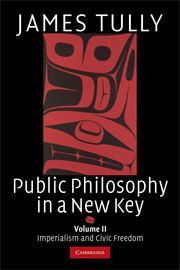Book contents
- Frontmatter
- Contents
- Acknowledgments
- Credits
- INTRODUCTION
- PART 1 GLOBAL GOVERNANCE AND PRACTICES OF FREEDOM
- 1 The Kantian idea of Europe: critical and cosmopolitan perspectives
- 2 Democracy and globalisation: a defeasible sketch
- 3 An ecological ethics for the present
- 4 The unfreedom of the moderns in comparison to their ideals of constitutional democracy
- PART 2 ON IMPERIALISM
- CONCLUSION: CIVIC FREEDOM CONTRA IMPERIALISM
- Bibliography
- Index to Volume II
4 - The unfreedom of the moderns in comparison to their ideals of constitutional democracy
Published online by Cambridge University Press: 05 September 2012
- Frontmatter
- Contents
- Acknowledgments
- Credits
- INTRODUCTION
- PART 1 GLOBAL GOVERNANCE AND PRACTICES OF FREEDOM
- 1 The Kantian idea of Europe: critical and cosmopolitan perspectives
- 2 Democracy and globalisation: a defeasible sketch
- 3 An ecological ethics for the present
- 4 The unfreedom of the moderns in comparison to their ideals of constitutional democracy
- PART 2 ON IMPERIALISM
- CONCLUSION: CIVIC FREEDOM CONTRA IMPERIALISM
- Bibliography
- Index to Volume II
Summary
INTRODUCTION
This is a period of rapid constitutional and democratic change around the world. Old and new constitutions – local, national, supranational, regional, global – are in transition and so are old and new concepts of constitutionalism. One response of political philosophers has been to reflect critically on the prevailing principles of legitimacy of constitutional democracy in the light of these changes in practice, testing the adequacy of the principles in one direction and the legitimacy of the changes in the other. In this fourth chapter I would like to make a constructive contribution to this on-going European and North American debate over constitutional democracy by presenting and defending public philosophy and civic freedom as an effective way to criticise and democratise globalisation from above. I do this by starting within the debates over a range of dominant and agonistic approaches, and showing how, step by step, internal criticisms of their limitations lead to the more radical, practice-based and civic freedom-oriented public philosophy in a new key.
The first section provides a brief synopsis of work on the principles of legitimacy over the last ten years, laying out two principles of constitutional democracy and six main features of how they work together in testing the legitimacy of democratic constitutional practice. The second section sets out three large-scale trends of constitutional change in practice from the perspective worked up in section 1 and suggests that these trends threaten or diminish democratic freedom.
- Type
- Chapter
- Information
- Public Philosophy in a New Key , pp. 91 - 124Publisher: Cambridge University PressPrint publication year: 2008
- 1
- Cited by

